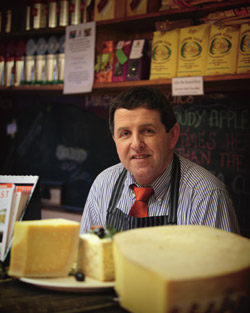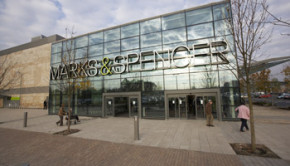A new radical

His radical vision for Irish food retailing is starting to sound less radical to the mainstream. Peter Ward talked to ShelfLife about why he believes there is a better way
13 October 2009
For the last 27 years Peter Ward has dedicated his life to food, primarily through his café and deli Country Choice in Nenagh, Co Tipperary.
Formerly chairman of the Taste Council of Ireland, he was also just recently named ‘Person of the Year’ by Good Food Ireland. Ward is no stranger to the many agricultural shows and food fairs that take place throughout Ireland and such is his reputation in food, it would not be uncommon to find him speaking or judging contests at any of these events.
Apart from food he might perhaps be best known for his strongly held views about the Irish grocery sector and the chokehold placed on small indigenous suppliers therein, and indeed his bluntness when it comes to expressing such opinions.
For all of these attributes, he made an interesting if not radical choice of speaker at ADM Londis’ annual conference this year. With the opening remarks, “Now that you’re all no longer developers I appeal to you to become grocers again,” it was clear he had come with the full intent of stirring up a reaction and, hopefully, a little revolution.
His presentation was rousing, even uncomfortable at times in its directness, such as when he declared that his business is “small, sustainable and profitable,” while those of the attending retailers are “large, sustainable and less profitable.” Or when he urged them: “don’t raise your flag over six cheap chicken breasts,” but instead learn how to buy a good quality heifer and sell that. Or when he asked: “How many of you know retail and how many of you people know about food?”
There were several moments that may have caused his listeners to shift in their seats, but at the crux of it all, his message goes to the heart of most independent Irish retailers. His absolute belief that more genuine engagement with artisan and small food producers will lead to more profits for retailers, greater connection with their local communities, and ultimately a sustainable, long-term solution for driving local economies and maintaining jobs in the Irish food sector, resonates deeply with the ethos of independent retailers in Ireland.
He repeatedly stressed the “huge” potential for Irish artisan foods as a genuine platform for differentiation and margin generation, which he demonstrated through the success of his own 500 sq ft food store. Most convincing of all however, was the passion and real conviction behind his presentation, as he enjoined his audience to follow his example and “allow fresh food to drive the whole economics of your shop,” and “become drivers of your own local economies” through food.
Speaking to ShelfLife prior the event, Peter Ward gave some more candid answers, about himself, his business and the Irish food industry at large.
How did you first become involved in food retailing?
I came from a remarkable background in food. My father was a cattle dealer and travelled all over Ireland. I remember him bringing home black pudding from Ashe’s of Annascaul, lots of fresh fish, always, and meat from his favourite butchers around the country. And my mother was a poultry keeper par excellence, as were my grandmothers. We grew up on a diet of good meat, good chicken, and we had lots of our own vegetables from a good kitchen garden, so it has always been very important to me.
I suppose then I fell into Dunnes Stores; it wasn’t a plan but I ended up staying with them. I realised very quickly though that these people sold a lot of food but not an ounce of it had a grain of personality. It was very different from what I came from. I always say, they taught me retail but food I taught myself.
What was the business like when you opened up in 1982?
It was exciting times; we still had a lot of great butcher shops and traditional bakers and great local growers of food. We started off buying a quantity of Irish artisan cheeses from a man named Michael Horgan in Richardstown. Things like Beara and Milleens and Errigal; such beautiful products and they were in their absolute infancy. We must never forget that Irish food was fantastic at that time, but this went into a transition and lost a lot of its shine in the 1990s.
What changed, in your view?
It think there was a great excitement over supermarkets and their products. There was a feeling that the ‘new’ was better, and there was a little more affluence around so people felt that they could spend more money on ‘modern’ food, for wont of a better expression, packaged and processed food.
By contrast, our port of call at that time was always the country shows and we were constantly on the look out for new talent. We started picking up suppliers and built up this incredible network of people, and they became my bedrock in supply of rural produce. And they became friends, I might add. The hunt for food became an all-consuming passion.
What would you change about the business?
If I was take every Londis shop in Ireland, these family businesses many of them, and look at everything that they’ve got going for them and their position in the community, I would say to them: ‘do you realise how well positioned you are to be a driver in this sector? All you need to do is develop a little bit more passion for food and to become food-driven and produce-driven as a business, because the opportunities are there.’
I’m talking about the artisan industry, I’m not talking about six apple tarts at the back of your counter. I’m saying that the potential for growth in the Irish economy for artisan foods is huge. I’m talking about the guy with a small farmers market stall with the potential to turn over a million a year.
If people like that can’t find market, it is a very serious national question for us. And I do believe that the whole network of Londis can give these people market. They can give them a purchasing contract like they’ve never had before, these small businesses, even if just in three of four shops. They can give them preferential treatment, they can make them their partners in produce.
The whole message is: if someone, like the people who own Londis shops, were to ring-fence a small amount of their purchasing, they could become champions of local food. And they’re allowed do that within in their own group.
They could bring on the next generation of talented artisans. If you could identify someone local who is a great producer of apple juice, or a great maker of smoothies, you could bring that person forward so they could get a listing from your group. On the basis of an introduction from you – because you have prototyped their product and it sells – they have a much greater chance of getting into their central distribution system then they would have had if they had cold-called at the head office with their product.
That is real support of the community, and support of the real economy. These shops really do have a following in their towns, on the basis of the family and the community. But community involvement is a lot more than giving a laptop to the local national school and a few free footballs or jerseys to the local team. It’s a lot more than that. You can be a driver of your local economy.
Do you believe the grocery sector needs increased regulation to protect Irish food?
No. Regulation in this country has been a contributor to anti-competitiveness. I am not in favour of any more regulation; every ounce of regulation renders an item of food more expensive because compliance is expensive. We have to evaluate every piece of legislation that pertains to the food industry to learn its impact on the cost of the end product for the consumer.
Should large multiples be made to reveal their profits?
Absolutely, they occupy such a dominant position in the Irish retail landscape. We need to look at how they treat their suppliers, look at what their whole costings are. We need to look at their whole planning regime.
Do you believe that Irish consumers will support local products?
Do know what, I do, because every day of the week every the consumer is going to be aware that there is close on 400,000 people unemployed in this country and 65,000 people emigrating this year, and they have to be the children of consumers, or first cousins, they have to be consumers themselves.
The reality of it is, if they know that the way they purchase their food is immensely political, in terms of who they support, and if they’re aware that their purchasing patterns can be a driver of their own local economy and can get food companies back on their feet again, I am confident if they know this that they will alter their purchasing to suit that.
It comes back down to getting food from being an anonymous product to being the produce of an Irish family farm or an Irish small business; that we will relate more to people than we do to product.
What is your vision for your own business in the future?
I will be a very happy father if even one of my children goes into a similar business. I don’t expect them to work under my feet and I probably don’t expect them to work at 25 Kenyon Street, Nenagh. But I think that if they see the vision that I have for food and if they share that vision, which I think they do, they will realise that there will be a future for people in the Irish food industry at a sustainable level.



 Print
Print






Fans 0
Followers